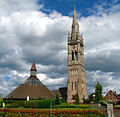Portal:Northern Ireland
|
The Northern Ireland Portal
Introduction  Northern Ireland (Irish: Tuaisceart Éireann [ˈt̪ˠuəʃcəɾˠt̪ˠ ˈeːɾʲən̪ˠ] ⓘ; Ulster Scots: Norlin Airlann) is a part of the United Kingdom in the north-east of the island of Ireland. It has been variously described as a country, province or region. Northern Ireland shares an open border to the south and west with the Republic of Ireland. At the 2021 census, its population was 1,903,175, making up around 3% of the UK's population and 27% of the population on the island of Ireland. The Northern Ireland Assembly, established by the Northern Ireland Act 1998, holds responsibility for a range of devolved policy matters, while other areas are reserved for the UK Government. The government of Northern Ireland cooperates with the government of Ireland in several areas under the terms of the Good Friday Agreement. The Republic of Ireland also has a consultative role on non-devolved governmental matters through the British–Irish Governmental Conference (BIIG). Northern Ireland was created in 1921, when Ireland was partitioned by the Government of Ireland Act 1920, creating a devolved government for the six northeastern counties. As was intended by unionists and their supporters in Westminster, Northern Ireland had a unionist majority, who wanted to remain in the United Kingdom; they were generally the Protestant descendants of colonists from Britain. Meanwhile, the majority in Southern Ireland (which became the Irish Free State in 1922), and a significant minority in Northern Ireland, were Irish nationalists (generally Catholics) who wanted a united independent Ireland. Today, the former generally see themselves as British and the latter generally see themselves as Irish, while a Northern Irish or Ulster identity is claimed by a significant minority from all backgrounds. The creation of Northern Ireland was accompanied by violence both in defence of and against partition. During The Troubles in Ulster (1920–1922), the capital Belfast saw major communal violence, mainly between Protestant unionist and Catholic nationalist civilians. More than 500 were killed and more than 10,000 became refugees, mostly Catholics. For the next fifty years, Northern Ireland had an unbroken series of Unionist Party governments. There was informal mutual segregation by both communities, and the Unionist governments were accused of discrimination against the Irish nationalist and Catholic minority. In the late 1960s, a campaign to end discrimination against Catholics and nationalists was opposed by loyalists, who saw it as a republican front. This unrest sparked the Troubles, a thirty-year conflict involving republican and loyalist paramilitaries and state forces, which claimed over 3,500 lives and injured 50,000 others. The 1998 Good Friday Agreement was a major step in the peace process, including paramilitary disarmament and security normalisation, although sectarianism and segregation remain major social problems, and sporadic violence has continued. (Full article...) Selected article -Lesbian, gay, bisexual, transgender, and queer (LGBTQ) people in Northern Ireland enjoy most of the same rights as non-LGBTQ people. However, the advancement of LGBTQ rights has traditionally been slower than the rest of the United Kingdom, with the region having lagged behind England, Scotland, and Wales. Northern Ireland was the last part of the United Kingdom where same-sex sexual activity was decriminalised, the last to liberalise blood donation policy for men who have sex with men and, after intervention by the Parliament of the United Kingdom, the last to allow same-sex marriage. Compared to the neighbouring Republic of Ireland, all major LGBT rights milestones had been reached earlier in Northern Ireland, with the exception of same-sex marriage. Homosexuality was decriminalised in Northern Ireland a decade earlier and civil partnerships were introduced six years earlier. Most liberalisation of LGBT rights in Northern Ireland has been achieved under direct rule by the Government of the United Kingdom, British parliamentary legislation or court decisions rather than through laws passed by the Northern Ireland Assembly. This is due to the veto power exercised by opponents of LGBT rights, such as the Democratic Unionist Party, under Northern Ireland's power-sharing system. In 2017, ILGA rated Northern Ireland last place in the United Kingdom for LGBT people, with 74% equality of rights compared to 86% LGBT equality in the United Kingdom overall and 92% equality in Scotland, but above the Republic of Ireland which was ranked 52% the same year. (Full article...) Selected picture -Northern Ireland listsRelated portalsSelected biography -Michelle O'Neill (née Doris; born 10 January 1977) is an Irish politician who has been First Minister of Northern Ireland since February 2024 and Vice President of Sinn Féin since 2018. She has also been the MLA for Mid Ulster in the Northern Ireland Assembly since 2007. O'Neill was previously deputy First Minister of Northern Ireland from 2020 to 2022. O'Neill served on the Dungannon and South Tyrone Borough Council from 2005 to 2011. In 2007, she was elected to represent Mid Ulster in the Northern Ireland Assembly. She served as the first female Mayor of Dungannon and South Tyrone from 2010 to 2011. She has been serving as Vice President of Sinn Féin since 2018. In 2011, she was appointed to the Northern Ireland Executive by deputy First Minister Martin McGuinness as Minister for Agriculture and Rural Development. In 2016, she was promoted to Minister of Health. In January 2020, she became deputy First Minister of Northern Ireland after the New Decade, New Approach agreement restored the power-sharing executive. (Full article...) Did you know (auto-generated) -
WikiProjectsThings you can do
TopicsCategoriesRecognized Content
Featured articlesGood articles
Featured listsAssociated WikimediaThe following Wikimedia Foundation sister projects provide more on this subject:
Northern Ireland on Wikipedia
Web resources
Discover Wikipedia using portals |











































